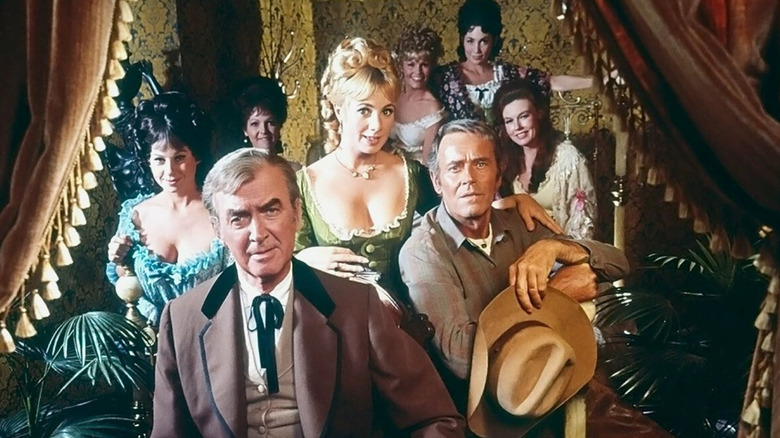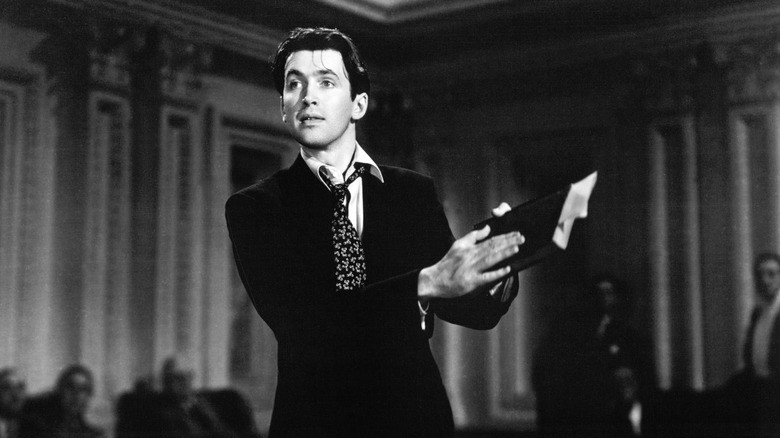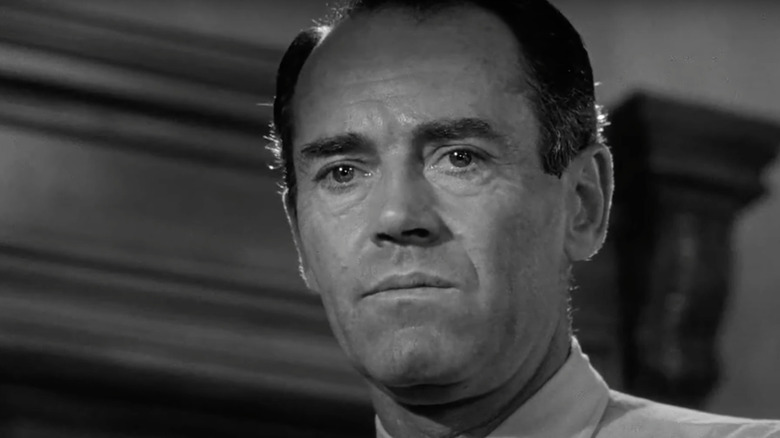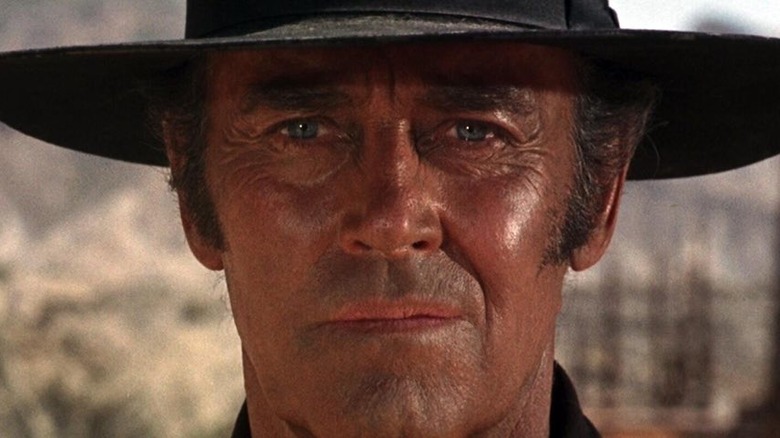How Broadway Made James Stewart And Henry Fonda Lifelong Friends
Some friendships are so iconic that they can inspire a whole book's worth of retelling. That's the case with James Stewart and Henry Fonda: "Hank and Jim," a 2017 book by Scott Eyman, chronicles the lifelong friendship of these two Hollywood legends.
In some ways, the two were quite similar: despite their movie star status, they carried themselves with Midwestern modesty. In other ways, they were very different: Stewart was a Republican hawk and Fonda a New Deal Democrat. Despite this, they remained friends for almost five decades until Fonda's death in 1982 (Stewart would pass 15 years later, in 1997). In fact, their friendship goes back to the beginning of their acting careers; not in Hollywood, but on Broadway. Here's how the friendship of "Hank and Jim" began and endured.
How a friendship was born
Turner Classic Movies' biography of Stewart includes a passage explaining how he and Fonda met. In 1932, they were both members of a Massachusetts theater company, the University Players. The two became roommates, continuing to lodge together even once the company headed to New York for a production of "Carry Nation." Broadway is where both men's careers took off. In 1935, Fonda was cast in 20th Century Fox's "The Farmer Takes a Wife," based on a play he'd starred in the previous year. The same year, Stewart was able to parley his theater acting into a contract with Metro Goldwyn Mayer; he made his screen debut in 1935 as well, in crime thriller "The Murder Man." In Hollywood, they became roommates once more.
According to Eyman, Hollywood illuminated the differences between the two:
"Stewart took to Hollywood immediately. He liked the environment. He liked the sunshine. He liked working at the studios. He had no qualms about being a contract actor at MGM. Fonda bridled. Fonda did not like being told what to do — not ever."
The differences don't end there. While Stewart was well known for his "aw shucks" politeness on and offscreen, Fonda was a more reserved man. Yet while Fonda was a womanizer who married five times, Stewart settled down for life with Gloria Hatrick McLean in 1949. However, Fonda and Stewart's friendship endured these differences, the bustle of Hollywood, and ultimately World War II.
A friendship's endurance
When the United States entered World War II, both Fonda and Stewart volunteered. Stewart had a long interest in aviation — one of his and Fonda's shared past times was model planes. Thus, he enlisted in the Air Force, climbing the ranks to become a decorated Colonel. Fonda, on the other hand, signed up for the Navy, earning the rank of Lieutenant, junior grade, before his discharge.
After their shared military service concluded, Stewart moved in with Fonda; Stewart had leased his house during the war and his tenant still had four months to go. During this time, Fonda's children, Peter and Jane, came to know Stewart as "Uncle Jimmy." Fonda's children speculate that their father and Stewart's shared understanding of what the other went through in war brought them even closer. As Jane Fonda told Eyman in "Hank and Jim":
"Dad was a pent-up guy, but the friendship with Jimmy was as intimate as he ever got with anybody. They were both tall and skinny, both laconic and shy, both loners — it took Jimmy a long time to warm to people. And they had the same sense of humor — wry and goofy."
Their friendship did come to a test when they clashed over their political views in 1947. Eyman writes:
"Stewart remembered that the argument with Fonda was 'long' and 'pretty-heated.' It ended only when they both realized that they were stomping on very thin emotional ice. They were jeopardizing their friendship, and neither man was willing to do that over politics or, for that matter, anything else."
The two promised each other they would debate politics no longer, wanting to spare themselves the trouble. Given that in 1982, Stewart visited Fonda "every day" while his friend on death's door, it seems they kept their promise.
Parallel careers
Fonda and Stewart appeared in a handful of movies together during their contemporary careers, including "On Our Merry Way," "How The West Was Won," and "The Cheyenne Social Club." It's interesting to compare their careers, however, even when they weren't working together.
Across Fonda's collaborations with John Ford and Stewart's with Frank Capra, they came to fit into a similar archetype: the decent, down-to-earth All-American man it was impossible not to like. Stewart's career-defining roles as Sen. Jefferson Smith and George Bailey come to mind. Meanwhile, about two decades before Fonda would play the avatar of good citizenship in "12 Angry Men," he played the historical ideal of good citizenship, Abraham Lincoln, in "Young Mr. Lincoln."
Audiences so strongly associated both of the two as good guys that some of their later roles are built on subverting that. In Stewart's collaborations with Alfred Hitchcock, "Vertigo" in particular, he plays less saintly characters. In "Once Upon A Time In The West," Fonda plays the murderous outlaw Frank; an arc is even built around revealing his face like it's a twist. Fonda explained, "Sergio Leone had cast me because at this moment he could imagine audiences saying, 'Jesus Christ, that's Henry Fonda!'"
While Fonda's reveal in "Once Upon A Time In The West" is like a slap in the face, in "Vertigo," Stewart's is slower and more insidious. Seeing Scottie become abusive to Judy (Kim Novak) is shocking because you don't expect that kind of behavior from a Jimmy Stewart character.
Despite their differences, the similarities Stewart and Fonda shared are why they were able to play characters with such overlap and why, in the end, their friendship endured 50 years.



